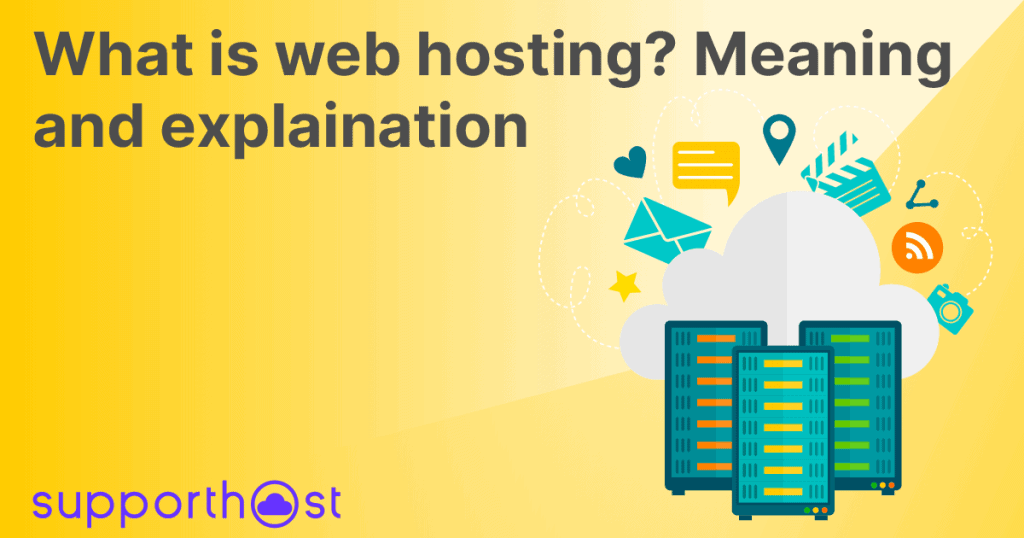In this article, What is web hosting? Meaning and explanation, we will see everything you need to know about hosting, its meaning, the differences between hosting and housing, what web hosting services include and what and how many types of web hosting exist.
Speaking of hosting, the meaning may not be clear to newbies who are taking their first steps towards creating a website. Along with the term hosting and its meaning, there are a number of terms that include domain, server and URL. They are all words related to the creation of a site and knowing them will allow you to better navigate the web.
But what exactly is hosting? Let’s start from the beginning and answer the first question that brought you to this article by going to discover the meaning of hosting.
Table of Contents
Hosting meaning
Let’s start from what Hosting is, the meaning indicates a network service that allows you to make a website accessible.
The term hosting (meaning to host) refers to the hosting services made available to allow the publication of websites. Web hosting is created to allow the publication of content on the net, but what does the service consist of?

To better understand the meaning of hosting we need to understand how websites work. To do this we must be familiar not only with the word hosting and the meaning but also with the terms server and domain.
The difference between a hosting and a server
In order for the content of a site to be accessible, hosting providers provide webspace and the necessary resources for the site to be reachable online. To do this, the sites are stored, or we can say hosted, following the term hosting and its meaning, on a computer network, the server.
Providers (or web hosts) provide their servers to allow companies and individuals to create a website. The alternative would be to buy your own dedicated server, but as we have seen talking about the cost of a dedicated server, it is not a cheap solution nor affordable for everyone in terms of management.
The server can be for the exclusive use of a single user, as happens with dedicated servers. In other cases, the resources of a single server can be used to host multiple sites, as happens in shared and semi-dedicated hosting.
However, web hosting services can also rely on clusters of servers used to create virtual servers or cloud infrastructures for services such as VPS cloud hosting.

When we talk about a server we can refer to a physical machine, a virtual machine or software called the server, web server or web server that runs on a server. When we refer to the server as software, we are talking about the program that has the task of handling requests from a client. Among the most widely used web servers are Apache and NGINX.
Here is a practical example to understand how the client/server model works.
For instance, the browser, which is the program we use to access the internet, is a client that sends requests to a web server. The server processes the request and sends a response along with an HTTP status code that provides information about the processing status of the request.
Specifically, successful requests are accompanied by an HTTP 200 code. Other specific codes are used to indicate errors.
For example, errors while processing the request (e.g. a 404 content not found error or server problems in fulfilling the request (error 500, 502 bad gateway or 504 gateway time-out).

Remember that web servers can also be installed locally, in this case, we often talk about localhost web servers. Basically, you use local development platforms like (MAMP or XAMP) to develop or test a site before bringing it online.
Now that we have introduced what hosting is and the meaning of server, let’s move on to the difference between hosting and domain.
Hosting meaning and difference between hosting and domain
Domain and hosting are both indispensable elements for an online project and you should be familiar with them if you want to know how to create a website. Let’s get back to the concept of hosting.
Hosting meaning: in simple words hosting is the service that provides you with the resources needed to bring your website online and the space inside a server where the contents of your website are stored.
The internet domain, however, also called domain name or just domain is the name of your site. Examples of domain names are:
- google.it
- wikipedia.org
- supporthost.com
Domain names are unique, that is to say that each domain name will correspond to only one site. In order to register a domain, in fact, you must make sure that the name you choose is among the free domains.
The Domain Name System (DNS) is used to link each domain to a physical IP address. So when you want to connect to a website, you only need to remember a name (like supporthost.com) rather than having to remember a numeric IP address like 123.45.678.1.
Remember that there is a difference between domain and URL, the latter in fact corresponds to a complete address.
Let’s take a look at it right now with some examples:
- https://supporthost.com/seo-audit/
- https://en.wikipedia.org/wiki/Domain
As you can see in these examples the URL contains the domain, but it also contains the protocol (https) and the path of the destination page.

Just as each site has a unique domain, each web page also has a unique URL.
Hosting and Housing: what are the differences?
When it comes to web activities, the terminology used can often confuse the non-professional. Housing and hosting are among the terms that are most easily confused, but their meaning and what they offer are different.
It should be made clear from the outset, in fact, that these two solutions are different from each other. We have already seen what hosting is: with this service one or more sites are hosted on a server owned by the provider.
In hosting services the management of the server is entrusted to the provider, it is the web host, in fact, with its technical support deal with configuring and managing the server. When you choose a dedicated solution you can decide whether to choose a managed server or an unmanaged server.
What is the difference? In the second case you choose to deal directly with the technical management of the server (updates, security and troubleshooting). In managed services, however, you rely completely on the management of the provider and you can interface with the server through the control panel.
Now that we have clarified in detail what hosting is and the meaning of these services, let’s examine a different solution: housing.
Housing consists in buying a server that will be hosted in the server farm of the provider. As you can guess, therefore, in this case you are the owner of the server, while in the case of hosting you rent a server or part of it.
What services do web hosting providers offer?
Depending on the service you choose, you not only have everything you need to create a website, but you can have other added services available as well.

Mainly web hosting providers allow you to:
- change hosting
- register or transfer a domain
- Buy e-mail and PEC (Certified Electronic Mail services)
- Buy reseller hosting services
- Buy SSL certificates for your site
- install software with one click (for example on SupportHost we use Softaculous)
- have automatic backups of your site
- have support 24 hours a day, 7 days a week.
Types of hosting meaning
Now that you understand what hosting is and what its meaning is, you should know that providers offer different hosting options.
When you find yourself choosing a hosting, you also have to choose the plan based on the resources available to you. Each plan, in fact, has hosting resource limitations that basically refer to disk space, CPU and RAM.
Beware of ads that offer unlimited hosting because in most cases they are a scam and offer no guarantees.
Depending on the requirements of your site, space needed, need for special configurations and traffic to the site, you can choose the solution that suits you. Let’s see what the main types of hosting are and what each one means.
Free Hosting
Undoubtedly the cheapest web hosting option you can find on the market. It may be suitable for a personal blog, but it does not fit a professional solution. Let’s briefly consider the disadvantages of free hosting compared to a professional solution.
A professional site that represents a brand on the web should have a personal domain, while free hosting solutions allow you to have a domain name like:
- mywebsite.wordpress.com
- username.wixsite.com/nameofwebsite
The second major disadvantage of free hosting is the presence of advertisements that you have no control over and cannot remove as long as you continue to use a free solution.
In addition to this, you also have limited resources, no right to support in case of problems, and you are also restricted in personalization and features. For example, with WordPress.com you can create a site with a free plan, but you won’t be able to install as many plugins as you’d like.
Shared hosting
Shared hosting is among the most widely used hosting solutions, in a shared hosting multiple accounts and therefore multiple sites are hosted on the same server. This means that server resources (such as space, CPU, and RAM) are shared among different users.
In order for a single account not to monopolize and overload the entire server, monitoring systems are used to make sure that all accounts are within limits and to be able to ensure quality service to all users.
If your website grows and the resources of a shared plan are no longer enough, you can upgrade to a higher plan.
With SupportHost you can upgrade or downgrade your plan at any time or contact us if you want help finding the best solution for your site.
Shared hosting often has a bad reputation and is considered less secure and less reliable than other web hosting services.
In our case we strive to ensure the security of each account so that there is no difference between a cloud vs shared plan. Each account is isolated from the others on the same server, so any hacker attack on a single account has no way to reach the other sites.
Also, thanks to the real-time monitoring of all accounts you won’t have any inefficiencies. In case an account uses an excessive amount of resources or has a peak of visits, the other sites hosted on the same server are not affected.
With SupportHost performance is guaranteed in two ways. Firstly by avoiding overselling and therefore not overloading the server with more accounts than necessary. Moreover, thanks to our continuous monitoring system, if a single account exceeds the resources it is temporarily suspended, so the other accounts do not risk slowdowns or a site crash.
Semi-dedicated Hosting
In a semi-dedicated hosting the server hosts a limited number of accounts, this way you can guarantee higher resource limits than those of a shared plan.
A semi-dedicated web hosting plan is generally recommended for those who want to create an commerce site. Or to those who have a site with many visits for which the resources of a shared plan are no longer sufficient or those who need to host multiple sites on a single account.
With SupportHost in addition to being able to choose one of the semi-dedicated hosting plans, you can also opt for a solution already prepared for a CMS. For example, our WordPress hosting is a semi-dedicated hosting where you’ll find WordPress already installed and ready to use.
Cloud hosting
Cloud hosting or VPS cloud hosting solutions allow you to lean on multiple servers to create virtual machines.
The biggest advantage of a cloud web hosting service is the scalability. To switch from one plan to another, if you need more resources, you don’t need to move data from one server to another. In addition, cloud infrastructure ensures better resource distribution and hardware redundancy.
A cloud hosting solution is suitable if your site has special needs or if you have large volumes of visits.
Dedicated server
Unlike shared web hosting solutions, in a dedicated server all server resources are at your disposal.
As we have just seen when examining cloud hosting plans, the advantages of dedicated solutions lie in the ability to configure and customize the server according to your needs. Dedicated servers are suitable for hosting business sites and applications, but also for gaming.
Hosting meaning of managed and unmanaged plans
With dedicated solutions (dedicated servers and VPS cloud hosting) you have two types of services available.
You can opt for an unmanaged plan and take care of the technical management of the server or for a fully managed plan and entrust the management of the service to the provider. Managed solutions are designed precisely for those who can not count on staff with system knowledge.
Conclusion
By now, this article, What is web hosting? Meaning and explanation should have cleared some of your doubts. You should be familiar with what hosting is, the meaning and explanation of hosting services and the main types of services.
We’ve also seen that in order to take your first steps into the world of web hosting you need to know the differences between hosting and domain, know what a server is and don’t confuse the term hosting with housing.
Do you have a better understanding of what hosting is or do you still have questions on the topic? Let me know in the comments below.





Leave a Reply